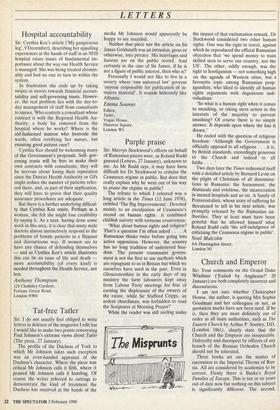LETTERS
Hospital accountability
Sir: Cynthia Kee's article ('My gangrenous leg', 9 December), describing her appalling experiences at the hands of staff in an NHS hospital raises issues of fundamental im- portance about the way our Health Service is managed. She was being treated abomin- ably and had no one to turn to within the system.
In frustration she ends up by taking swipes at moves towards financial accoun- tability and self-governing trusts. Howev- er, the real problem lies with the day-to- day management of staff from consultants to nurses. Who controls a consultant whose contract is with the Regional Health Au- thority, a body far removed from the hospital where he works? Where is the old-fashioned matron who bestrode the wards, often terrifying her nurses, but ensuring good patient care?
Cynthia Kee should be welcoming many of the Government's proposals. Self- gov- erning trusts will be free to make their own contracts with consultants, they will be nervous about losing their reputation since the District Health Authority or GPs might reduce the number of patients refer- red there, and, as part of their application, they will have to prove that their quality assurance procedures are adequate.
But there is a further underlying difficul- ty that Cynthia Kee omits. Perhaps as a woman, she felt she might lose credibility by saying it. As a man, having done some work in this area, it is clear that many male doctors almost instinctively respond to the problems of female patients in a flippant and discourteous way. If women are to have any chance of defending themselves — and as Cynthia Kee's article illustrates this can be an issue of life and death — more accountability (of every kind) is needed throughout the Health Service, not less.
Anthony Thompson
124 Cholmley Gardens, Fortune Green Road, London NW6


















































 Previous page
Previous page